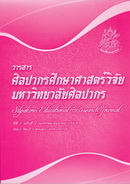พฤติกรรมการบริโภคอาหารขยะ ของนักศึกษาระดับปริญญาตรีในจังหวัดนครปฐม : กรณีศึกษา มหาวิทยาลัยเกษตรศาสตร์ และ มหาวิทยาลัยศิลปากร
บทคัดย่อ
บทคัดย่อ
การวิจัยเรื่องนี้ใช้วิธีการวิจัยแบบผสม (Mixed Methodology) ทั้งเชิงปริมาณและเชิงคุณภาพ มีวัตถุประสงค์ 1) เพื่อศึกษาระดับพฤติกรรมการบริโภคอาหารขยะ 2) เพื่อเปรียบเทียบพฤติกรรมการบริโภคอาหารขยะของนักศึกษาทั้ง 2 มหาวิทยาลัยที่มีปัจจัยส่วนบุคคล ที่แตกต่างกัน 3) เพื่อศึกษาปัจจัยที่มีผลต่อการบริโภคอาหาร คือ การรับรู้เกี่ยวกับการบริโภคอาหาร แรงสนับสนุนทางสังคมในการบริโภคอาหาร ความสามารถของตนเองในการบริโภคอาหาร การรับรู้ข้อมูลข่าวสารและความเชื่อในการบริโภคอาหาร เป็นปัจจัยที่มีอิทธิพลในการทำนายพฤติกรรมการบริโภคอาหารขยะ ประชากรที่ใช้ในการวิจัยคือ นักศึกษาระดับปริญญาตรีในมหาวิทยาลัยเกษตรศาสตร์และมหาวิทยาลัยศิลปากรจำนวน 17,035 คน โดยสุ่มตัวอย่างแบบชั้นภูมิ (Stratified Random Sampling) ได้จำนวนตัวอย่าง 391 คน ระยะเวลาในการเก็บรวบรวมข้อมูล ระหว่างเดือนพฤศจิกายน 2552 - มกราคม 2553 เครื่องมือที่ใช้ในการวิจัยครั้งนี้ เป็นแบบสอบถามและแบบสนทนากลุ่ม สถิติที่ใช้วิเคราะห์ข้อมูล ได้แก่ ค่าความถี่ (Frequency) ค่าร้อยละ (Percentage) ค่าเฉลี่ย (Mean) ส่วนเบี่ยงเบนมาตรฐาน (S.D.) การทดสอบค่าที (t-test) การวิเคราะห์ความแปรปรวนทางเดียว (One Way ANOVA) เมื่อพบความแตกต่างในเชิงสถิติทำการเปรียบเทียบพหุคูณ (Multiple Comparison) ด้วยวิธีการของเชฟเฟ่ (Scheffe’s Method) การวิเคราะห์การถดถอยพหุคูณแบบขั้นตอน (Stepwise Multiple Regression Analysis) และการวิเคราะห์เนื้อหา (Content Analysis)
ผลการวิจัยสรุปได้ดังนี้ 1) พฤติกรรมการบริโภคอาหารขยะ ในภาพรวมอยู่ในระดับ ปานกลาง 2) การวิเคราะห์เปรียบเทียบพฤติกรรมการบริโภคอาหารขยะ เมื่อจำแนกตามปัจจัยส่วนบุคคล พบว่า ช่วงอายุ ชั้นปีการศึกษา คณะวิชา มหาวิทยาลัย รายได้เฉลี่ยต่อเดือน ความพอเพียงของรายได้ และภูมิลำเนา ที่แตกต่างกัน มีพฤติกรรมบริโภคอาหารขยะไม่แตกต่างกัน ส่วน เพศ และที่อยู่ปัจจุบัน ที่แตกต่างกันมีพฤติกรรมการบริโภคอาหารที่แตกต่างกัน อย่างมีนัยสำคัญทางสถิติที่ระดับ .05 3) ปัจจัยสนับสนุนที่ส่งผลต่อพฤติกรรมการบริโภคอาหารขยะ คือ การรับรู้ข้อมูลข่าวสาร และ ความเชื่อในการบริโภคอาหารมีประสิทธิภาพในการทำนายร่วมกันต่อพฤติกรรมการบริโภคอาหารขยะ ร้อยละ 41.5 ที่ระดับนัยสำคัญทางสถิติ .05 และสามารถเขียนเป็นสมการการวิเคราะห์ถดถอยพหุคูณ ดังสมการ
Y = .269 + .501(การรับรู้ข้อมูลข่าวสาร) + .279(ความเชื่อในการบริโภคอาหาร)
Z = .474 Z (การรับรู้ข้อมูลข่าวสาร) + .223 Z (ความเชื่อในการบริโภคอาหาร)
Abstract
Based on both of the integrated research methodologies as to quantitative and qualitative methods, this objective of research were 1) knowledge level of the junk food consumption behaviors. 2) to compare the junk food consumption behaviors of 2 bachelor degree university students different personal factors. and 3) to study the factor affecting food consumption were awareness of the food consumption behaviors , the social support of the food consumption behaviors , ability food consumption ,awareness information and belief in the food consumption influencing in the junk food consumption behaviors. The research populations a study of a sample of 391 bachelor degree university students by Stratified Random Sampling. The data was collected during November 2009 to January 2010. The data-gathering instruments used in the research were a questionnaire and focus group. The data were analyzed by frequency, percentage, mean, standard deviation, t-test, one-way analysis of variance, multiple comparison by scheffe’s method, stepwise multiple regression analysis and content analysis.
The results of research revealed that: 1) The junk food consumption behavior levels of students was at a moderate level 2) The learning the junk food consumption behaviors with different personal factors were found that expressed no differences in age ,class year , faculty , university , occupations and region with statistical significance at the level of .05 Considering with sex and currents address held differences with statistical significance at the level of .05 3) The support factors influencing in the junk food consumption behavior were found that awareness information and belief in the food consumption can be predict predicted to operation effectively in the junk food consumption behavior at 41.5% as follows: Y = .269 + .501(awareness information) + .279(belief in the food consumption) and Z = .474 Z ( awareness information) + .223 Z(belief in the food consumption)





